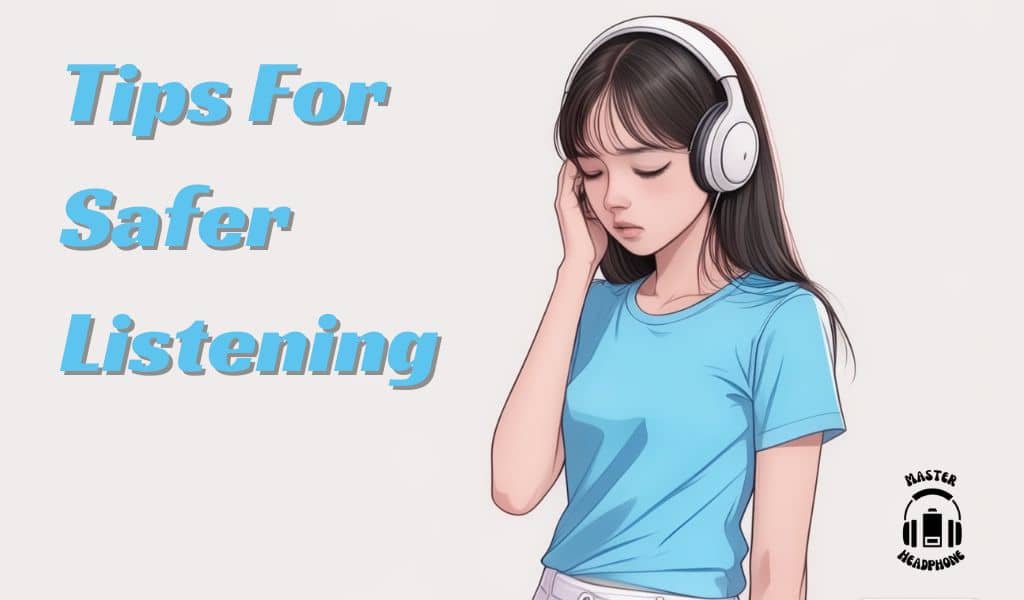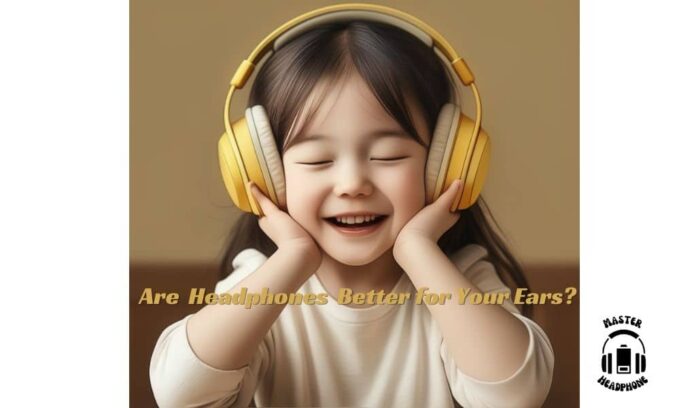Headphones can be better for your ears as they can limit external noise and reduce the need for high volume levels, ultimately reducing potential ear damage. When used responsibly, headphones can provide a more controlled sound environment for your ears, minimizing the risk of hearing impairment.
This is particularly important in loud or distracting settings, where headphones can help maintain a safe listening level. However, it is important to ensure that the headphones fit well and are comfortable to wear for extended periods, as improper fit can cause discomfort or potential harm to the ears.
By choosing the right type of headphones and using them responsibly, you can enjoy your music while prioritizing the health and safety of your ears.
Understanding Ear Safety
Basics Of How Sound Affects Ear Health
Exposure to loud noises, including high-volume music through headphones, can cause damage to the delicate structures in the inner ear. The tiny hair cells responsible for picking up sound vibrations can be permanently damaged by excessive noise, leading to hearing loss over time. Understanding the impact of sound on ear health is crucial for maintaining good auditory well-being.
Overview Of Safe Listening Practices
Adopting safe listening practices is essential for preserving your ear health while enjoying music through headphones. Some recommended practices include using noise-cancelling headphones to reduce the need for high volumes, taking regular breaks from continuous listening, and keeping the volume at a moderate level. Implementing these practices can significantly reduce the risk of hearing damage and promote ear safety.
Common Misconceptions About Headphones
There are several misconceptions about headphone usage and its effects on ear safety. For instance, using headphones with a lower volume setting does not entirely eliminate the risk of hearing damage if the exposure is prolonged. Additionally, the type of headphones used can impact sound delivery to the ears, affecting the overall safety of the listening experience. Dispelling these misconceptions is crucial for ensuring that headphone users prioritize their ear safety.
Evaluating Headphone Types
In-ear Versus Over-ear Headphones
When it comes to evaluating headphone types, one of the key considerations is whether to opt for in-ear or over-ear headphones. In-ear headphones, also known as earbuds, are small, lightweight and fit directly into the ear canal. They are portable and great for on-the-go use. However, they may not provide the same level of noise isolation as over-ear headphones. On the other hand, over-ear headphones are larger, cover the entire ear, and are known for their superior sound quality and noise isolation. They are ideal for longer listening sessions, as they distribute the pressure more evenly around the ears.
Noise-cancelling Technology And Ear Health
Noise-cancelling technology has become increasingly popular in headphones, but its impact on ear health is a topic of concern. While noise-cancelling headphones can help reduce the need for high volume levels in noisy environments, they also pose some risks. The continuous use of noise-cancelling headphones at high volumes can lead to ear fatigue and potentially increased risk of hearing loss. It’s crucial to use these headphones responsibly and give your ears regular breaks, especially in quiet environments where the noise-cancelling function is not necessary.
Volume Limits And Audio Quality Considerations
When evaluating headphone types, one cannot disregard the importance of volume limits and audio quality considerations. While it’s tempting to crank up the volume for an immersive experience, it’s crucial to be mindful of the safe listening volume to prevent ear damage. Look for headphones that come with built-in volume limiters to protect your ears from excessive noise exposure. Additionally, consider the audio quality of the headphones, as poor quality sound can lead to prolonged listening and potential ear strain.
Tips For Safer Listening

When it comes to enjoying your favorite music or podcasts, using headphones is a common practice. However, it’s important to consider the potential impact on your ears. To promote safer listening, here are some tips to keep in mind for using headphones responsibly.
Recommended Volume Levels While Using Headphones
It’s essential to be mindful of the volume level when using headphones. The World Health Organization recommends keeping the volume at 60% of the maximum level to help prevent hearing damage. By adhering to this recommended volume level, you can safeguard your ears from potential harm caused by prolonged exposure to loud sounds.
Duration Of Headphone Use: Best Practices
In addition to volume levels, the duration of headphone use is also crucial for ear health. Experts suggest limiting headphone use to no more than 60 minutes at a time to allow your ears to rest. Taking breaks between longer listening sessions can help minimize the risk of developing hearing issues associated with extended headphone use.
Importance Of Breaks And Auditory Rest
Regular breaks and auditory rest are vital components of safe headphone usage. Giving your ears a break every 60 minutes can help prevent auditory fatigue and reduce the likelihood of experiencing ear discomfort. Incorporating short periods of auditory rest into your headphone usage routine is a simple yet effective strategy for maintaining ear health.
Personalizing Your Audio Environment
Customizing Headphone Settings For Safety
When using headphones, it’s essential to pay attention to the volume levels. Most devices offer options to cap the maximum volume to reduce the risk of hearing damage. Setting a safe volume limit can help protect your ears from excessive noise exposure. Take advantage of these features and customize your headphone settings to ensure your ears are safe from harm.
Environmental Noise Considerations
Environmental noise can have a significant impact on your listening experience. Noise-cancelling headphones can help block out external distractions, enabling you to enjoy your music at lower volumes. Consider the environmental noise around you and choose headphones that offer adequate noise isolation to prevent the need for high volume levels in noisy settings.
Choosing The Right Headphones For Your Lifestyle
When selecting headphones, it’s crucial to consider your lifestyle and usage habits. For active individuals, sweat-resistant, secure-fitting earbuds may be the best option for workouts. On the other hand, over-ear headphones provide a more immersive experience for home listening. Make sure to choose headphones that align with your daily activities and preferences to enhance your overall audio experience.
Preventing Long-term Damage
When it comes to ear health, it’s crucial to take proactive measures to prevent long-term damage caused by headphones. Understanding the early signs of hearing loss and knowing when to seek professional advice can significantly impact your ear health. There are also long-term strategies that can help maintain your ear health and prevent potential damage. Let’s delve into these essential aspects of preventing long-term damage from headphone use.
Recognizing Early Signs Of Hearing Loss
Recognizing early signs play a vital role in preventing long-term damage to your ears. Some common signs of hearing loss due to headphone use may include:
- Difficulty understanding speech, especially in noisy environments
- Frequently asking others to repeat themselves
- Ringing or buzzing in the ears (tinnitus)
- An overall decrease in the quality of sound perception
When And How To Seek Professional Advice
Seeking professional advice is essential if you experience any of the above signs or if you have concerns about your ear health. It’s advisable to consult with an audiologist or an ENT specialist who can conduct a thorough assessment of your hearing. Timely professional intervention can help prevent further deterioration and provide suitable recommendations for preserving your ear health.
Long-term Strategies For Maintaining Ear Health
Implementing long-term strategies can go a long way in maintaining your ear health. Some effective measures include:
- Limiting the duration and volume of headphone use
- Choosing headphones that prioritize sound quality and minimize potential damage
- Taking regular breaks during extended headphone use
- Engaging in activities that promote overall ear health, such as ear-safe exercises or using ear protection in noisy environments
- Ensuring regular screenings and check-ups with an audiologist or ENT specialist
Frequently Asked Questions Of Are Headphones Better For Your Ears?
Are Headphones Better Than Earphones For Your Ears?
Wearing headphones instead of earphones can be better for your ears as they distribute sound more evenly and reduce the risk of hearing damage. Headphones also sit outside the ear, minimizing the potential for ear infections and discomfort. However, it’s essential to use them at a safe volume.
Do Noise-canceling Headphones Protect Your Ears?
Yes, noise-canceling headphones can help protect your ears by reducing the need to turn up the volume in loud environments. They block out external sounds, allowing you to enjoy your music at a lower, safer volume level. This can contribute to preventing hearing damage and fatigue in noisy settings.
Can Headphones Cause Tinnitus Or Ringing In The Ears?
Overexposure to loud volumes through headphones can contribute to tinnitus or ringing in the ears. Listening to high sound levels for an extended period can damage the delicate hair cells in the inner ear, leading to tinnitus. It’s crucial to use headphones at a moderate volume to prevent such issues.
Is It Safe To Use Headphones For Extended Periods?
Using headphones for prolonged periods, especially at high volumes, can pose a risk to your hearing health. It’s essential to take breaks and give your ears a rest to prevent fatigue and potential damage. Keeping the volume at a moderate level and taking regular breaks can help protect your ears.
Conclusion
The debate on headphones’ impact on ears is ongoing. Nonetheless, moderation is vital. Using headphones at safe volumes and taking regular breaks can help protect your ears. Ultimately, your listening habits and choice of headphones play significant roles in their impact on your ears’ health.
It’s essential to strike a balance for the well-being of your ears.

